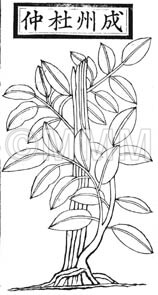Crude drug sample data base
※Click on the image to enlarge it.
Scientific information data base
| Common name | 杜仲, Duzhong, Eucommiae Cortex (JP18, CP2020), Eucommia Bark (JP18, CP2020) | |||||
|---|---|---|---|---|---|---|
| crude drug image |
| |||||
| Original plant name | Eucommia ulmoides Oliver , (Tochū) | |||||
| original plant image |
| |||||
| Family name | Eucommiaceae | |||||
| Used part | bark | |||||
| Quality for selection | Good Duzhong has thick and moist bark. It produces lots of silver filiform threads when it is folded crosswise and stretched. (TN) | |||||
| Official compendium | JP XVIII, CP (2020 ed.) | |||||
| Clinical application | As a tonic, painkiller and antihypertensive, Duzhong is applied for deficiency of the kidney, pain of knee and low back, back problem of pregnant women, weakness of legs, threatened abortion and hypertention. | |||||
| Medical system | Traditional Chinese medicine | |||||
| Drug effect in traditional medicine | Traditional classification | Replenishing Yang(vital function) drugs | ||||
| Beneficial effect | [Property and Flavor] Warm; sweet. [Meridian Tropism] Liver and kidney meridians. [Actions] To tonify liver-kidney, strengthen smew and bone, prevent miscarriage. [Indications] Deficiency of liver-kidney, limp aching in the lower back and knees, lack of strength of sinew and bone, diziness and vertigo, vaginal bleeding during pregnancy, threatened abortion. | |||||
| Chemical constituent | Other aliphatic and related compounds (*C1): Eucommiol (*C3): 1-Deoxyeucommiol(葉/leaf) Monoterpenoids iridoids: (*C1): Aucubin, Harpagide acetate, Ulmoside (= Aucubigenin-1-beta-isomaltose), Geniposide, Geniposidic acid Lignans & Neolignans (*C1,C2): d-Pinoresinol di-O-beta-D-glucopyranoside, Liriodendrin, d-Pinoresinol O-beta-D-glucopyranoside, d-Medioresinol di-O-beta-D-glucopyranoside | |||||
| Chemical structure |
※画像をクリックすると、拡大して表示されます。 | |||||
| Pharmacological effect | Parasympathomimetic action (water extract). | |||||
| DNA sequence | L01917,L54066 | |||||
| Classical reference (Chinese Herbal Classic "Zhenglei bencao") |  ※Click this image to see the actual image ※Click this image to see the actual image | |||||
| Disease | Heaviness and powerlessness in lumber and knee, Lower back pain, Impotence, Frequent urination, Irregular vaginal bleeding, Habitual abortion, Threatened abortion, Hypertension | |||||
| Formulation | Ishoho, Kagenhachimotsuto, Kamishimotsuto, Kyukihochuto, Daibyakuchuin, Daibofuto, Hointo | |||||
| Related drugs | Duzhongye (Eucommia Leaf) | |||||
| References | JP18: The 18th edition of the Japanese Pharmacopoeia. CP2020: Pharmacopoeia of the People's Republic of China 2020 edi. C1)The Encyclopedia of Wakan-Yaku with Color Pictures Vol. II, pp 142-144. C2)Outline of Pharmacognosy, a Textbook, pp 319-320. C3)Shoyakugaku Zasshi,42,76(1988). | |||||
| Remarks | Tochūyō is the leaf of Duzhong (Jap. name: Tochū) and sold in the market as a health food under the name of Tochūyōcha or Tochūcha. Reportedly, it has benefits in diuresis, promoting metabolic function etc. Taiwanese Duzhong is the bark of Euonymus trichocarpus Hayata of family Celastraceae (Jap. name: Togeminomasaki). | |||||
| Last renewal date | 2021/09/27 | |||||











